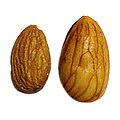Imbibition
Imbibition is a special type of diffusion when water is absorbed by solids-colloids causing an enormous increase in volume. Examples include the absorption of water by seeds and dry wood. If imbibition is carried out in an isotropic medium with a uniform concentration gradient, it leads to swelling of the medium. This is also known as water absorption.
Process of Imbibition[edit]
The process of imbibition is initiated when water is absorbed by the hydrophilic colloids, which leads to an increase in volume. This process is influenced by the affinity between the adsorbent and the liquid. The greater the affinity, the greater the rate of imbibition. The process of imbibition is also influenced by the temperature and the pressure of the system.
Examples of Imbibition[edit]
Some examples of imbibition include the swelling of seeds and dry wood upon exposure to water. In the case of seeds, imbibition is critical for the initiation of germination. The dry seed takes up water, which leads to the swelling and breaking of the seed coat, and ultimately the emergence of the radicle. In the case of dry wood, imbibition causes the wood to swell, which can cause structural damage if the wood is a part of a building or a piece of furniture.
Importance of Imbibition[edit]
Imbibition is important in various biological processes. It is crucial for the germination of seeds, and it also plays a role in the movement of water in plants. In addition, imbibition is also important in cooking, as it is the process that allows dry food items like rice and pasta to absorb water and become edible.
See Also[edit]
Ad. Transform your life with W8MD's Budget GLP-1 injections from $75


W8MD offers a medical weight loss program to lose weight in Philadelphia. Our physician-supervised medical weight loss provides:
- Weight loss injections in NYC (generic and brand names):
- Zepbound / Mounjaro, Wegovy / Ozempic, Saxenda
- Most insurances accepted or discounted self-pay rates. We will obtain insurance prior authorizations if needed.
- Generic GLP1 weight loss injections from $75 for the starting dose.
- Also offer prescription weight loss medications including Phentermine, Qsymia, Diethylpropion, Contrave etc.
NYC weight loss doctor appointmentsNYC weight loss doctor appointments
Start your NYC weight loss journey today at our NYC medical weight loss and Philadelphia medical weight loss clinics.
- Call 718-946-5500 to lose weight in NYC or for medical weight loss in Philadelphia 215-676-2334.
- Tags:NYC medical weight loss, Philadelphia lose weight Zepbound NYC, Budget GLP1 weight loss injections, Wegovy Philadelphia, Wegovy NYC, Philadelphia medical weight loss, Brookly weight loss and Wegovy NYC
|
WikiMD's Wellness Encyclopedia |
| Let Food Be Thy Medicine Medicine Thy Food - Hippocrates |
Medical Disclaimer: WikiMD is not a substitute for professional medical advice. The information on WikiMD is provided as an information resource only, may be incorrect, outdated or misleading, and is not to be used or relied on for any diagnostic or treatment purposes. Please consult your health care provider before making any healthcare decisions or for guidance about a specific medical condition. WikiMD expressly disclaims responsibility, and shall have no liability, for any damages, loss, injury, or liability whatsoever suffered as a result of your reliance on the information contained in this site. By visiting this site you agree to the foregoing terms and conditions, which may from time to time be changed or supplemented by WikiMD. If you do not agree to the foregoing terms and conditions, you should not enter or use this site. See full disclaimer.
Credits:Most images are courtesy of Wikimedia commons, and templates, categories Wikipedia, licensed under CC BY SA or similar.
Translate this page: - East Asian
中文,
日本,
한국어,
South Asian
हिन्दी,
தமிழ்,
తెలుగు,
Urdu,
ಕನ್ನಡ,
Southeast Asian
Indonesian,
Vietnamese,
Thai,
မြန်မာဘာသာ,
বাংলা
European
español,
Deutsch,
français,
Greek,
português do Brasil,
polski,
română,
русский,
Nederlands,
norsk,
svenska,
suomi,
Italian
Middle Eastern & African
عربى,
Turkish,
Persian,
Hebrew,
Afrikaans,
isiZulu,
Kiswahili,
Other
Bulgarian,
Hungarian,
Czech,
Swedish,
മലയാളം,
मराठी,
ਪੰਜਾਬੀ,
ગુજરાતી,
Portuguese,
Ukrainian




